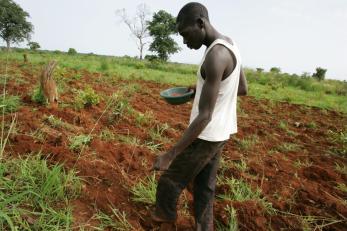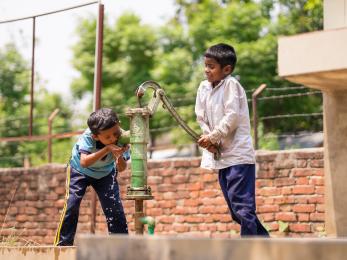Young People & Agriculture: Strategic Priorities for Impact

The future is farming. Can you(th) dig it?
Mercy Corps believes young people around the world can drive their economies forward through the immense potential of agriculture. We also believe that engaging youth more meaningfully in farming as well as in agriculture, can provide young people not simply with income, but also with work that is meaningful, respectable, and attractive. We seek to change the narrative that youth view work in agriculture as ‘dirty’ or a ‘last resort’ economic option. In fact, our recent research in Liberia found just the opposite: young people identified this work as popular and ‘the surest way of getting rich.’ Agriculture’s ‘image problem’ doesn’t exist universally and the development community should not make such assumptions but seek to understand each individual’s perceptions, constraints, and motivations to succeed.
While Mercy Corps engages young people ages 10-24 in many dimensions of agriculture, including employment and nutrition, we see three key areas of strategic importance:
Empower adolescent girls (ages 10-19) for nutrition and security.
Fostering girls’ involvement in homestead agriculture (i.e., increased access to and ownership of home gardens, including small ruminants) can have substantial impacts. Building girls’ knowledge and skills around agriculture, coupled with life skills such as decision-making, nutrition knowledge and financial literacy, can contribute to improved nutrition and food security for households and communities. Investing in girls is also an avenue to cultivating more equitable gender norms that support their participation in their families and communities. When girls have access to basic skills, increased decision-making and economic opportunities including engagement in agriculture, they marry later, have fewer children, and are more likely to seek healthcare for their children. This is confirmed by one study that shows that young women with a basic education invest at least ten times more income into their families as compared to young men.
Engage youth (ages 15-24) to revolutionize on-farm production.
The farming population is aging – the average age of farmers in the world is 60. The population demographic is increasing and changing - we need to increase our production of food by 70% by 2050 to nourish the world’s population. Simultaneously, agricultural productivity is stalling; and young people do not always see a lucrative future in agriculture but prefer to seek employment in urban areas. To meet the world’s food needs in a sustainable manner, we need innovative and motivated youth engaged in agriculture production. And on-farm production needs young people to grow and transform. This necessitates creative solutions that transform production into an interesting, profitable, and prestigious livelihood for young people.
Beyond the farm: Unlock opportunity in agriculture markets for youth (ages 15-24).
Agricultural markets extend far beyond the farm. However, when some young people consider work in ‘agriculture’ they often focus solely on work in the fields and not on the full scope and offerings of a given value chain and larger agricultural systems. Due to limited market information, lack of networks, and constrained mobility, among others, many young people are not aware of the variety of income opportunities that exist along the way from farm to consumers. Mercy Corps believes that identifying specific, appropriate entry points for male and female youth along agriculture markets and unlocking these economic opportunities are critical to strengthening the agricultural and food sectors and increasing incomes. For example, in a palm oil market, male youth may be engaged at the front end (as producers) and females at the end (as sellers), but they may not be aware of or capitalizing on the diverse income opportunities along the way, such as processing, packaging, transportation, and storage. Quite often, a wide array of overlooked or undiscovered employment and self-employment off-farm opportunities await youth in any given value chain.
Read our Youth & Agriculture: Strategic Priorities for Impact ▸

